Sebastian Daniels’ Ground Culture is focused on bringing township entrepreneurs into the formal economy, helping bridge the gap in Cape Town with an online store and cafés stocked with products made locally by them.
WHAT happens when a 52-year-old beekeeper from the Khayelitsha township in Cape Town meets an entrepreneur born in 1994? Old school meets new energy and honey gets sold at 10 times the rate it used to, as the beekeeper is now connected to the formal market. This is what Sebastian Daniels does best, integrating the informal eKasi economy in Cape Town with mainstream market systems.
Daniels’ parents were both journalists and he had a good upbringing, also at times attending protests with his mom. This was the beginning of understanding how deeply segmented South African society was – and continues to be. Delving into history and Steve Biko, Daniels desired change.
First, he began working with the idea of creating a Stokvel app called Yethu, centered around the country’s famed Stokvel savings concept, where members contribute an amount regularly and receive a lump sum payment. It’s how many in the lower-income groups in South Africa save up for buying furniture, building houses or sending kids to school.
“People were so interested in what we had to offer. But what ended up happening is that we started building a system around the formal economy, and lost track of who our actual customer was in the end,” explains Daniels to FORBES AFRICA.
“When we launched people were like, ‘oh, we don’t want this, this is the bank’. You know, and that’s kind of really where you can start to like really see that the divide still exists, and that the informal economy operates in its own way that the formal sector doesn’t understand and doesn’t want to understand. The formal sector wants it done its own way.”

Two and a half years ago, Daniels’ dad passed away after a battle with dementia. An accomplished writer, his dad wrote ‘Sunny Side Up’ breakfast reviews that featured in ‘Weekend Argus’ for years. He was familiar with most of the coffee places having done reviews of over 150 establishments.
Inheriting that public connect, Daniels too made a commitment to go into Khayelitsha once a week, in order to understand the informal sector better.
Since then, he has made many connections that have eventually led to successful collaborations, such as between Siyabonga Mbaba and George Kirkinis. Mbaba runs the event, Ghetto Sessions, and it resonated with Kirkinis, who found sponsors for the music festival.
“That’s one of the proudest connections I made because I wanted to take someone that I felt was cool, to something that I thought was cool. And through that, a whole lot of other stuff happened,” explains Daniels.
“And that’s the level of where we need to understand white privilege and that kind of thing. It’s so much more than meets the eye. And it’s so much less that you need to do sometimes than you think. It’s often just one connection, one bit of guidance. Help someone with a pitch or a plan. Small things. It’s much smaller than you think. [We] need to get rid of that negative stereotype,” Daniels adds.
In Khayelitsha, Daniels also met Lufefe Nomjana from Spinach King, Msokoli Zilani of Ubusi Honey and Sikelela Dibela from Siki’s Koffee Kafe.
Incorporating all their products, during the lockdown, Daniels developed Ground Culture, an online store for local goods focused on bringing township entrepreneurs into the formal sector. He started strong, with 100 orders a month, and many repeat orders.
Ground Culture reinvests 10% of profits into the businesses it works with. Daniels says it was successful in the start, but as lockdown restrictions eased, people went back to the shops.
“So that’s why we’ve now come back to the coffee shop to have physical space to kind of just build foundations, and share our sustainability.
“You know, people really want to support township entrepreneurs, there is just difficulty. It’s not accessible. Where do you find these products? Often they’re not consistently on shelves, so you go back and it’s out of stock,” Daniels explains.
One of the biggest success stories out of Khayelitsha is the gluten-free spinach bread from Spinach King. Ground Culture receives endless calls about the product, and it’s their number one selling product by far.

“People get really annoyed because it’s out of stock quite frequently. And this is, again, the logistical problems that exist working between the informal economy and the formal economy; sitting in a factory in Khayelitsha, and somehow figuring out delivery routes to get into the formal sector with a fresh loaf of bread every single day.”
He says the logistical problems include inventory tracking, invoicing and following up on them – these things are not necessarily inbuilt because the informal economy is predominantly a cash-based system.
“It’s cash on delivery. If you borrow money, you learn that the whole community knows about it. It operates in a very different manner. So the formal sector assumes entrepreneurs are going to act like normal entrepreneurs, but they’ve been ingrained with a different kind of upbringing.”
Ubusi Honey is the right example for Daniels for what he believes the formal sector can do for township business. In March 2019, he met Zilani, a beekeeper in Khayelitsha who was originally selling 25kg of honey a month in the township.
“It’s been a super-cool relationship to work with him, because we come from totally different backgrounds, and to compare our differences and be really open and honest [is] what makes the relationship work.”
Over the course of 10 months, they worked together to rebrand the product and supply coffee shops. After almost a year, Ubusi Honey sold 250kg a month.
Similarly, Siki’s Koffee Kafe is the place Daniels has based a lot of his thinking off, and what he calls home in Khayelitsha.
“It’s been amazing to watch his [Dibela’s] progress, because it’s taught me so much about building a business in the sense that, as an informal sector player, you have to build one little step at a time.”
Daniels says that while he is blessed that he can fall back on family, go to the bank or get a credit card loan, in the informal settlements, there’s little going around to back any idea.
Dibela has worked for six years, and is now getting another coffee shop in Claremont with big names like Cassper Nyovest popping by to buy his coffee.
Behind the Claremont coffee shop is a clothing factory that offered Dibela the front courtyard free of charge, until he’s in a financial situation to pay rent.
“That’s the kind of collaboration that we need to see between the informal and the formal sector. Not the formal sector setting stringent rules on the informal sector players
that are just stepping into the game, just stepping into the market,” says Daniels.
A challenge that Dibela has faced is sourcing a roasting machine, and money for petrol to drive around to hand out samples between Khayelitsha and central Cape Town.
“Again, it’s access to markets. It’s just incredibly difficult, and the resources don’t exist to bridge that divide. And so that’s kind of what we need to be talking about and enabling – how do we make infrastructure that can allow for that to grow?”
Ground Culture is looking to be the first point to market for entrepreneurs that are testing out products, to get their foot in the door, and provide an income stream.
Ground Culture has a second café on Long Street in Cape Town, complete with local products, coffee, and food. They employ five people full-time and are looking for 30 new products for their online store.

Tied to their grant funding, 20 entrepreneurs who have been through training are going to be showcasing their items in the online store.
Speaking about the grueling effects of lockdown for all businesses, and the restrictions eventually lifting, Daniels says: “The kind of stuff we are starting to see is that people are very keen to do business. Now, a lot of people are tired and have resources. And then on the other side, there are people that don’t have any resources, but a lot of energy and good ideas.”
Sometimes all it takes to get them off the ground is a helping hand, or even a handshake.
